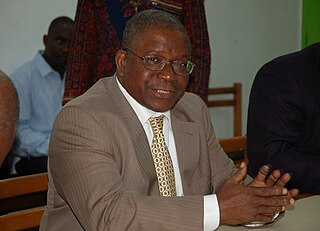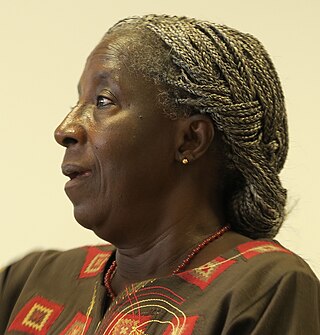
Mines Paris – PSL, officially École nationale supérieure des mines de Paris, is a French grande école and a constituent college of PSL Research University. It was originally established in 1783 by King Louis XVI.

AbbéFulbert Youlou was a laicized Brazzaville-Congolese Roman Catholic priest, nationalist leader and politician, who became the first President of the Republic of the Congo on its independence.

The Îles de Los are an island group lying off Conakry, Guinea, on the west coast of Africa. Their name is derived from the Portuguese Ilhas dos Ídolos, meaning "islands of the idols". They are located about two kilometres off the headland limiting the southern side of Sangareya Bay.
Carmen Maria de Araújo Pereira was a Bissau-Guinean politician. She served three days as Acting President in 1984, becoming the first woman in this role in Africa and the only one in Guinea-Bissau's history. She had the shortest term as the Acting President, serving only three days in office. She died in Bissau on 4 June 2016.

Chief Elizabeth Adekogbe was a Nigerian nationalist, politician, women's rights leader and traditional aristocrat. She was the leader of the Ibadan-based Women's Movement of Nigeria. In 1954, the movement changed its name to Nigerian Council of Women, which in 1959 merged with the Women's Improvement League to form the National Council of Women Societies, a dominant pressure group and a leading women's coalition in Nigeria.

Jean Suret-Canale was a French historian of Africa, Marxist theoretician, political activist, and World War II French Resistance fighter.

There is a large community of Mauritanians in Senegal, including tens of thousands of black Mauritanians expelled by their own government during a 1989 border incident.
Samun Dukiya is an archeological site in Nigeria in the Nok valley where artifacts from the Nok culture have been found, dating to between 300 BC and 100 BC.
Between June 5 and 6, 1963, the Guinean president Sékou Touré made an official visit to Brazzaville, the capital of the Republic of the Congo. He was received by the Congolese president Fulbert Youlou. The visit sparked protests against the Congolese government, marking a beginning to the popular movement that would end Youlou's rule two months later.
The Youth Council of the French Union was a coordinating body of youth organizations in the French Union. CJUF was founded in 1950. The organization had its headquarters in Paris and held annual congresses.
Marie Elisabeth "Bety" Sobobie of Betsimisaraka or Betia, was queen regnant of the kingdom of Betsimisaraka, consisting of the island Île Sainte-Marie and parts of eastern Madagascar, from 1750 to 1754 and 1762. She famously ceded the Île Sainte-Marie to France in 1750.

Pierre Kipré is a historian and writer from Ivory Coast. He is a former student of the École normale supérieure in Abidjan.

Sophie Lihau-Kanza or Zala Lusibu N'Kanza was a Congolese politician and sociologist. She was the first woman of her country to receive a secondary education, the first to graduate from a university, and the first to hold a government office in the Democratic Republic of the Congo, serving as Minister of Social Affairs from 31 October 1966 to 6 December 1970. In her later life she held positions within the United Nations.

Funco is a traditional Capeverdean house that originated in Africa.
Dominique de Courcelles is a French historian of ideas.
Catherine Massip is a French curator of libraries and musicologist.
Cécile Morrisson is a French historian and numismatist. She is Director of Research emeritus at the French National Center for Scientific Research and specializes in the study of the Byzantine Empire.

Fatou Sow is a Senegalese feminist sociologist specialising in sociology of gender.
Esther Oladunni Soyannwo was a Nigerian teacher and politician. In 1964 she was the first woman elected to the House of Representatives, but was unable to take her seat.
The Hautes Écoles Sorbonne Arts et Métiers University or HESAM University, located in Paris and in multiple campuses in France, is a center for higher education and research as a group of universities and institutions comprising 11 members and 4 associated institutions.










